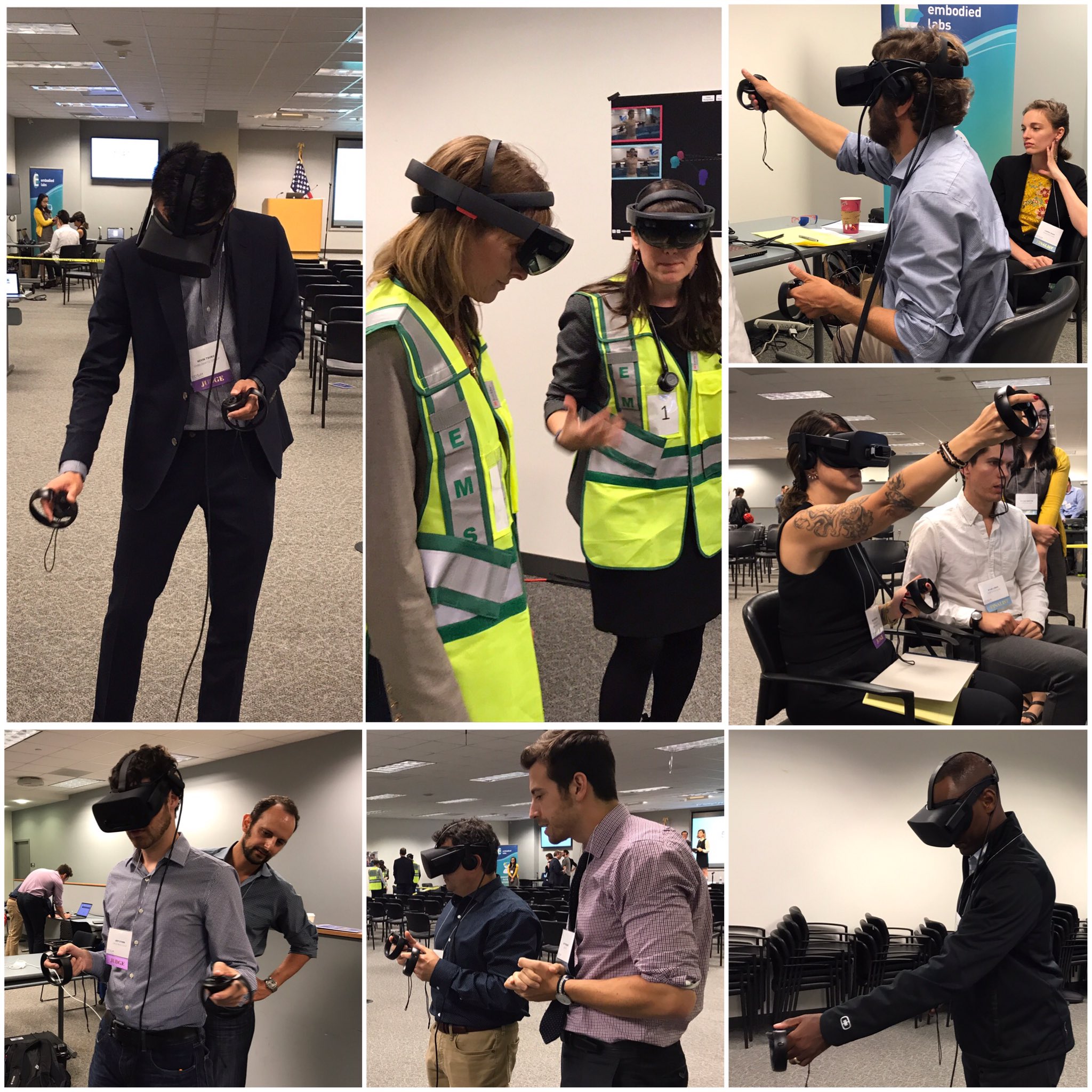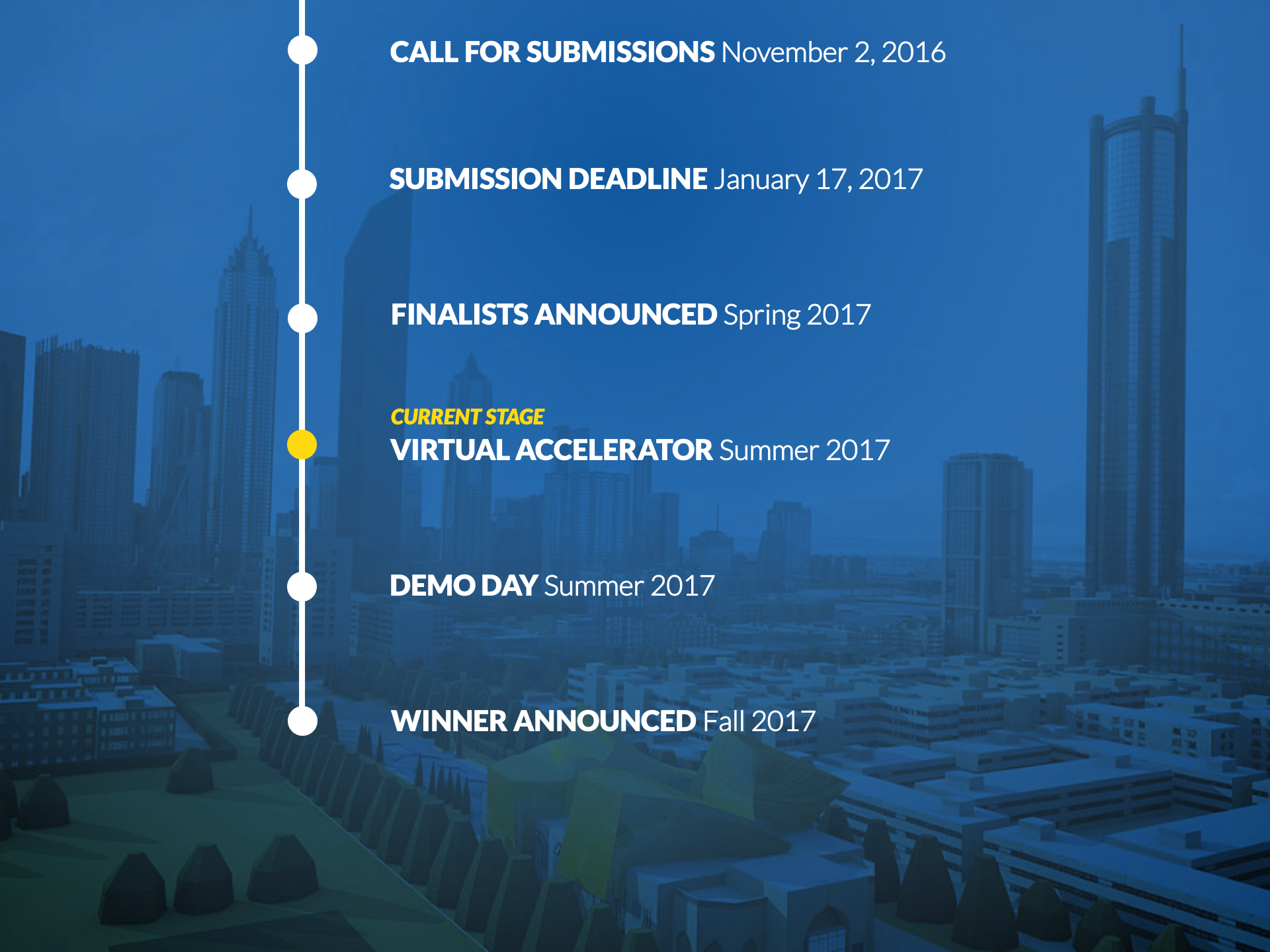Simulated environments, such as virtual and augmented reality, 3D simulations, and multiplayer video games, are emerging approaches to deliver educational content. Research indicates that simulation-based learning provides students with enriched experiences in information retention, engagement, skills acquisition, and learning outcomes.
As such, the EdSim Challenge sought next-generation educational simulations that strengthen academic, technical, and employability skills. The Department was most interested in immersive and engaging simulations that include clearly defined learning goals and build diverse skill sets.
The purpose of this Challenge was to stimulate the marketplace for computer-generated virtual and augmented reality educational experiences that combine existing and future technologies with skill-building content and embedded assessment. The developer community is encouraged to make aspects of simulations available through open source licenses and low-cost shareable components.
Public Feedback
A call for public feedback, which took place from November 4 to December 9, 2015, helped to shape the Challenge and generate qualitative data that would inform Challenge design. The comprehensive and diverse feedback showed that at a high-level, most respondents see the EdSim Challenge as an opportunity to publicly showcase best-in-class examples of highly engaging classroom simulations that provide needed training in critical thinking, problem solving, and other employability skills.
Following the Call for Public Feedback, a panel of industry experts reviewed public feedback and convened to deliberate on key Challenge design questions. Both public engagement and expert consensus made the case for a Challenge structured to produce a playable prototype simulation that is targeted to educational and career-path needs, with a viable path to procurement and implementation by a broad variety of school districts. Experts emphasized that solvers should be guided toward early thinking around technical components, data handling, assessment of learning outcomes and preliminary business models, but that the initial submission should have a low barrier to entry.
The expert panel included:
Shelly Blake-Plock, CEO, Yet Analytics, Inc.
Curtis Blais, Research Associate, MOVES Institute at Naval Post Graduate School
Phaedra Boinodiris, Global Lead for Game Development Ecosystem, IBM
Robert Chadwick, Systems Engineer IV, Advanced Distributed Learning
Barbara Chamberlin, Professor and Extension Educational Technology Specialist, New Mexico State University
Drew Davidson, Director of the Entertainment Technology Center, Carnegie Mellon University
Nicholas (Nick) DiCarlo, Vice President and General Manager of Immersive Products & Virtual Reality, Samsung Electronics America
Joan Hughes, Associate Professor of Learning Technologies, University of Texas at Austin
Jacquelyn (Jacki) Ford Morie, Founder, All These Worlds
Jonathan (Jono) Poltrack, Director of Operations / Tech Team Co-Lead, Advanced Distributed Learning
Michelle Riconscente, President, Designs for Learning
David Solomonoff, CEO, Zoetic Networks LLC
The Federal Register posting is the governing document for the EdSim Challenge, please read for additional details.
See the full Challenge Rules, Terms, and Conditions here (PDF).
At a Glance
Awards
$680,000
5 finalists received $50,000 and 1 grand prize winner received $430,000
Schedule
Nov - Dec 2015: Public Comment
Nov 2016 - Jan 2017: Open Submissions
Spring 2017: Finalist Announcement
Jun - Sep 2017: Bootcamp, Virtual Accelerator, and Demo Day
Oct 2017: Winner Announcement
Submission
Next-generation immersive and engaging educational simulations that include clearly defined learning goals and build diverse skill sets.
See full Submission Form here (PDF).
OCTAE Contact
Jenny Lambert
Jenny.Lambert@ed.gov
(202) 987-1304
Finalists
Grand Prize Winner — Osso VR
Osso VR is a highly-mobile surgical training platform that enables healthcare professionals to practice cutting edge techniques through realistic, hands-on simul
Holographic Applications to Transform Learning
Case Western Reserve Univeristy
Holographic Applications to Transform Learning uses holographic display technology, such as the Microsoft HoloLens, with multiple students to advance medical educational experiences and outcomes.
Embodied Labs
Embodied Labs, Inc.
Embodied Labs is an embodied patient experience lab that uses virtual reality to train students to become better caregivers of aging populations.
The Irregular: A Mystery at Baker Street
Octothorpe LLC
The Irregular: A Mystery at Baker Street is a VR experience that uses critical thinking, problem solving, and teamwork to explore skills related to success in STEM fields.
LifeCraft
Smart Sparrow
LifeCraft explores the story of life on Earth with VR voyages through biology, archaeology, astronomy, and beyond.
The Challenge assembled an esteemed panel of judges, who drew from diverse education and tech backgrounds. Based on their individual expertise, judges recommended five finalists to be selected by ED from the pool of eligible entries. During open submissions, 28 expert review panelists also supported the selection process. Once ED selected a group of finalists, the finalists then attended an Innovator’s Bootcamp, refined their submissions during the Virtual Accelerator phase, and presented their submissions on Demonstration Day (“Demo Day”).
Entries were scored by the judges based on the quality of each entry according to the criteria below. Each of the following selection criteria was assigned up to 5 points during the judging of open submissions in order to select finalists (for a total of up to 20 points for Finalists, and a total of up to 30 points for Winners):
Finalist Selection Criteria
Submissions were scored by the judges based on the quality of each submission according to the criteria below. Each of the following five selection criteria was assigned up to 20 points during the judging of open submissions in order to select finalists (for a total of up to 100 points):
- Learning Outcomes. The extent to which the submission contains (1) clearly defined academic, technical, and employability skill-learning objectives; (2) a comprehensive description of the desired change or improvement in the user’s knowledge and skills; and (3) an efficient mechanism to provide feedback to the user and instructor with respect to progress toward achievement of the learning outcomes.
- Engagement. The extent to which the submission describes an engaging user experience that is on par with commercially available entertainment games.
- Commitment. The extent to which the submission demonstrates an appropriate level of commitment and the ability of the entrant to move from concept to playable prototype within the timeline of the Challenge.
- Implementation Strategy. The extent to which the submission considers the implementation challenges that schools face, such as cost and potential technological constraints, including how to integrate with existing and future technology.
- Scalability and Expansion. The extent to which the submission demonstrates the scalability of the simulation, including its potential to connect with other simulations, as well as set the stage for a more competitive and robust marketplace for educational simulations.
Winner Selection Criteria
- Learning Outcomes. The extent to which the simulation prototype (1) contains clearly defined academic, technical, and employability learning objectives; (2) spurs change or improvement in the user’s knowledge and skills; and (3) provides data to the user and instructor with respect to progress toward achievement of the learning outcomes.
- Engagement – User Experience. The extent to which the simulation prototype demonstrates an engaging user experience on par with commercially available entertainment games.
- Engagement – User Interface. The extent to which the simulation prototype exhibits a thoughtful user interface design on par with commercially available entertainment games.
- Commitment. The extent to which the submission: (1) demonstrates the entrant’s evolution and improvement of the concept; and (2) illustrates the entrant’s ability and intention to improve upon and scale the simulation beyond the Challenge timeframe.
- Implementation Strategy. The extent to which the submission describes a detailed plan for implementation that takes into account potential barriers such as cost and technological constraints, including integration with existing and future technology, and proposes potential solutions to overcome such barriers.
- Long-term Vision. The extent to which the submission: (1) demonstrates a plan for encouraging collaboration among the developer community, including making aspects of the solution available through open source licenses; and (2) provides a vision of how the entrant’s plan will stimulate the broader educational simulation market.
Finalist & Winner Judges

Elizabeth Baron
—
Virtual Reality & Advanced Visualization Technical Specialist,
Ford Motor Company

Nonny de la Peña
—
CEO & Founder
Emblematic Group

Marlon Evans
—
CEO,
GSVLabs

Steve Issacs
—
Video Game Design & Development Teacher,
William Annin Middle School

Reshma Saujani
—
Founder & CEO,
Girls Who Code

Kurt Squire
—
Co-Director;
Games+Learning+Society Center in the Wisconsin Institute for Discovery

Kiki Wolfkill
—
Halo Transmedia & Entertainment Studio Head,
Microsoft's 343 Industries

Winner Announcement
October 19, 2017
The winner, Osso VR, was recommended by a panel of judges with expertise in education, gaming, workforce development, emerging technology, and venture capital. Osso VR offers a hands-on surgical training platform that enables users to practice cutting-edge techniques through realistic, hands-on simulations, bridging the gap between career exploration and career preparation. Osso VR won $430,000 in cash and additional in-kind prizes from IBM and Microsoft.

Demo Day at the Dept. of Education
September 18, 2017
The Virtual Accelerator phase culminated with a Demo Day, where a live audience joined the Challenge judges at the Department Of Education in Washington D.C. to see the five finalists compete for the $430,000 grand prize. Speakers included Sharon Lee Miller and Vint Cerf, and afterwards finalists presented their seven-minute pitches to the live audiences before offering immersive demonstrations of their simulations.

Virtual Accelerator
May - September 2017
During the Virtual Accelerator, finalists received individualized advice from industry-leading mentors — from instructional design to software architecture to VR game design — as they worked to refine their submission and develop a prototype. The Virtual Accelerator phase culminated in Demo Day, where each of the finalists presented their playable prototypes to the panel of judges.

Innovator's Bootcamp in NYC
Jun 1-2, 2017
The Challenge welcomed the five finalists to New York City for the Innovator’s Boot Camp. The program sought to spark new thinking about CTE student needs and edtech market fit as the finalists iterated their solutions to compete for the $430,000 grand prize. From user archetyping to interviews with educators to working sessions with VR and AR experts, the participants went deep on insights that would inform their product design.
Open Submissions
November 2, 2016 - January 17, 2017
The Challenge launched the open submission period in November 2016. “This initiative is an exciting example of how virtual reality and game technologies can be applied to give students everywhere the tools to prepare for future success,” said Johan Uvin, acting Assistant Secretary for Career, Technical, and Adult Education. At the conclusion of open submissions, five finalists were selected out of 249 submissions received.

Call for Public Feedback
November 4 - December 9, 2015
ED launched an open call for public feedback to help shape the Challenge design. Anyone who was interested had the option to submit their feedback about simulated learning subject areas, skill sets, technical considerations, and more.
IBM
IBM awarded an IBM bluemix package to one Challenge winner, as well as access to the IBM Glocal Entrepreneur Program and up to $120,000 of IBM Cloud credits.
Microsoft
Microsoft invited one winner to the BizSpark Plus program, inclusive of up to $120,000 Azure cloud services, free software, developer tools, and technical support for one year.
Oculus
Oculus awarded an Oculus Rift virtual reality headset to each of the five finalists.
Samsung
Samsung offered a Galaxy S7 Edge, a Galaxy Tab S2 9.7", a Gear S3 watch, a Gear VR headset, and an Oculus Mobile software developer kit (SDK) to each of the five finalists..
Included below are the many readings and free resources that were made available to solvers entering the EdSim Challenge.
Use of these resources and tools was optional, but encouraged.
Developer Resources
- Ed Tech Developer's Guide, U.S. Department of Education.
- xAPI Documentation, Github
- Model Terms of Service Guidance, Privacy Technical Assistance Center.
- Interoperability Strategies for Serious Games Development, Ioana Stanescu
- Open Government Initiative at ED, U.S. Department of Education
- ENGINES
- Open Source: Blender, Delta 3D, Godot, Panda3D, Virtual Reality Sandbox, High Fidelity
- Proprietary: 3ds Max, Unity, Unreal
- VIRTUAL REALITY
- Oculus: Introduction to Best Practices
- Samsung Gear VR: Samsung Developer Program, Oculus Mobile SDK, Samsung VR content library
- Google VR: Google VR Developer Center for (Daydream and Cardboard)
- AUGMENTED REALITY
- Microsoft Hololens: Develop for Hololens
Simulation-Based Learning
- Simulated Nation: The Promise of Virtual Learning Activities, Marc Prensky.
- A Field Guide to Educational Simulations, Clark Aldrich.
- Simulations for STEM Learning: Systematic Review and Meta-Analysis, SRI International.
- The 2013-2018 Worldwide Game-based Learning and Simulation-based Markets, Ambient Insight.
Career and Technical Education (CTE
- The National Career Clusters® Framework, Advance CTE.
- Education to Employment: Designing a System That Works, Diana Farrell, and Dominic Barton, McKinsey & Company..
- What is CTE?, Association for Career and Technical Education.
DISCLAIMER
This website contains information and resources from public and private organizations that may be useful to the reader. Inclusion of this information does not constitute an endorsement by the U.S. Department of Education (ED) of any products or services offered or views expressed. Blog articles provide insights on the activities of schools, programs, grantees, and other education stakeholders to promote continuing discussion of educational innovation and reform. Blog articles do not endorse any educational product, service, curriculum, or pedagogy.
This website also contains hyperlinks and URLs created and maintained by outside organizations, which are provided for the reader’s convenience. ED is not responsible for the accuracy of the information contained therein.
- ENGINES